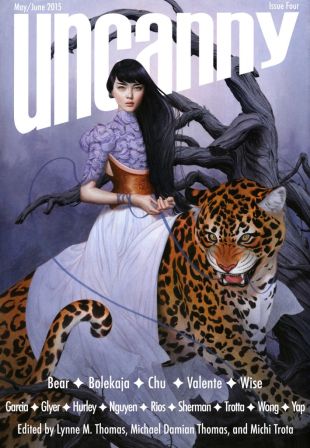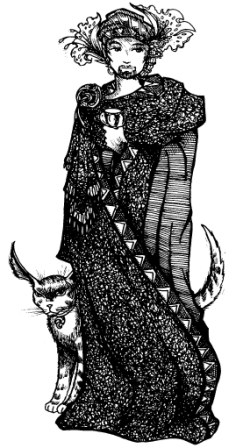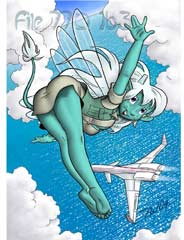aka The Puppy Who Mistook His Bark For A Hugo
Today’s roundup gathers together excerpts of Puppy-related thoughts from Mercy Pilkington, Paul St. John Mackintosh, Mike Glyer (who let him in here?), Deborah J. Ross, T.C. McCarthy, Kevin Standlee, Vox Day, Michael Kingswood, Tom Knighton, Lisa J. Goldstein, Jane Frank. Steve Davidson, Alexandra Erin and players to be named later. (Title credits go to File 770 contributing editors of the day Danny Sichel and DMS.)
Mercy Pilkington on Good E Reader
“The Sad Joke That Is the Hugo Awards” – May 5
Unfortunately, this year’s nominations have allegedly been shanghaied by a small collective of people under the name “Sad Puppies” and a rival group “Rabid Puppies” who are disheartened with the “touchy feely” decline of science fiction into a genre that allows gay couples and women who don’t have giant breasts to exist. The groups have garnered enough voting support to send their favorites to the top of the lists, then have seemingly been quite open about achieving their goals.
Paul St. John Mackintosh on TeleRead
“Locus Awards finalists show the power of open voting” – May 5
You’re either forced to assume that the liberal-left-loony conspiracy beloved of the Sad Puppies ringleaders extends across the entire internet – or that the SP promoters are just a bunch of histrionic opportunists who hijacked the voting process of a particular set of awards in the name of a particular ideological agenda. Which also makes you wonder what future history will make of the 2014 Sad Puppies Hugo list, if not a single one of them has made the cut in a more open ballot. Apologies to any fine writers besmirched by that comment, but in the circumstances, it’s understandable. And apologies too to the Locus Awards for casting their fantastic slate of contenders in the shade of the Hugos/Sad Puppies fiasco. All the same, people, compare and contrast.
Mike Glyer in Uncanny Magazine
“It’s The Big One” – May 5
Does The Award Matter? The award was forged as a weapon in the original culture war—the battle to earn acceptance for science fiction itself.
Isaac Asimov gave readers a taste of the mockery early science fiction fans endured in his introduction to a collection of Hugo–winning short fiction:
“You can imagine the laughter to which we were subjected when sensible, hard–headed, practical, every–day people discovered we were reading crazy stories about atomic bombs, television, guided missiles, and rockets to the moon. All this was obvious crackpotism that could never come to pass, you see.”
….Openly campaigning for a Hugo has long been culturally discouraged in fandom, however, that old–school tradition has not survived a collision with some other significant forces. Individual authors have been forced to shoulder the publicity burdens once carried by their publishers and one aspect of gaining attention is through awards – an approach discussed by Nancy Fulda (“Five Things You Should Know About Award Nominations”) on the SFWA Blog in January 2015. Furthermore, people steeped in the social media culture of constant self–expression and self–celebration have been conditioned to feel reticence is unnatural: Why wouldn’t they recommend themselves for an award?
Deborah J. Ross on Deborah’s Journal
“In Which Deborah Learns A New Word” – May 5
Normally, this is a politics-lite zone. Growing up in the ’50s with the McCarthy nuts breathing down my family’s neck has not endeared me to rancorous public discourse. I have, however, been following PuppyGate because I know some of the folks who withdrew their stories from the Hugo ballot and/or Puppy slate. The online debate has at times been pretty vile.
One of the few delightful things to come out of this mess is a new word: Puppysplaining. Akin to mansplaining, it refers to “Explaining to you how you really have no idea how completely wrong you are about your own lived experiences.” It comes to me from Gamer Ghazi. If it follows you home, you have my permission to keep it.
Kevin Standlee on Fandom Is My Way of Life
“Scheduling WSFS Business” – May 5
Because of a comment on the File 770 web site, I find that I’d better write about the subject of when the Business Meeting in Spokane will or might consider specific items, because it would appear some folks are taking this spot as the journal of record on such things.
( Parliamentary Neepery about Business Meeting SchedulingCollapse )
So it’s possible for the meeting to put off consideration of proposals until Day 5, the morning after the Hugo Award Ceremony. How could it do this?
( Agenda-Setting MechanismsCollapse )
I hope this explanation makes sense. It gets into a number of the finer points of parliamentary detail, but given the complexity of the tasks we may fact this year, I think it important that people understand what tools they have at their disposal.
Vox Day on Vox Popoli
“Bi-discoursality” – May 5
The interesting thing about rhetoric is that it makes no sense to those who are limited to the dialectic. I didn’t fully grasp the way it worked until reading RHETORIC for the second time. It can be bewildering when people tell you that they have been convinced by something that you know can’t logically have persuaded them. In such cases, you know they have been persuaded by rhetoric, not facts, reason, or logic.
I wouldn’t expect an individual who only speaks one form of discourse to be any more able to follow me into the other than if I abruptly switched to speaking Italian or French after beginning in English.
For example, this was written for dialecticals. Rhetoricals only see “blah blah blah, I’m so smart, blah blah blah, Aristotle” and scan through it seeking to find some point of attack they can use to minimize or disqualify me. And if they can’t, that’s when they strike a bored pose or return to the snarky ad hom.
Michael Kingswood on Magic, Swords, and Laser Beams
“Myke and Brad” – May 5
Look, I’ve had to set fellow officers straight before because they were messing up. Mostly those junior to me, occasionally a peer, and once or twice more senior officers, up to and including my CO. It’s part of the job, and expected: forceful backup is a primary tenet of submarine operations. So I have no issue with one officer correcting another.
That said, there is a way to do that sort of correction, and I do take issue with the nature, style, and content of Myke’s open letter.
The entire letter is condescending, and lacking in professional courtesy or respect. Does he honestly think that Brad doesn’t know that, as an officer, he has a duty to all of his men, regardless of their personal situation? Or does he just think Brad knows but doesn’t care? Brad’s been doing this for a long time now. I think he gets it. And who the hell is Myke to lecture anyway? He doesn’t work with Brad, doesn’t serve with him. They’re not in the same chain of command, and neither has authority over the other. Has he ever observed Brad’s professional behavior? If not, he’s just speculating not even based on hearsay, and has no standing to judge or cast dispersions.
Tom Knighton
“An Open Letter to Myke Cole” – May 5
Dear Myke,
As a veteran who is now firmly ensconced in civilian life, I’m writing you to discuss your open letter with CWO Brad Torgersen. This is not to defend Brad’s comments, because there is nothing I feel like defending. Brad was out of line, and I think he knows that. One thing I agree with John Scalzi on is that being gay is not anything to be ashamed of, so there’s no reason it should be categorized as an insult. Thus far, we are in agreement.
However, you chose to address this issue in an open letter. In and of itself, this wouldn’t normally be an issue. Open letters are quite common in this day and age. However, you opted to do so as a commissioned officer who is addressing a warrant officer. This is where I must take issue.
You are a commissioned officer, a lieutenant in the United States Coast Guard Reserves. You are addressing a warrant officer in the United States Army Reserves. In essence, you are addressing a junior officer in a different chain of command. As you are an officer, one would assume that somewhere in your training, you were instructed in how to address junior personnel while counseling them in matters such as proper execution of their duties.
If you were, then I am quite sure that the Coast Guard instructed you similarly to the way the Navy instructed me in such matters. Simply put, you handle stuff like this behind closed doors. A private message, an email, something. You address it directly and privately and, if that doesn’t resolve the matter, you address it with his chain of command.
However, that’s not what you did. Instead, you opted to put your disagreement with Brad’s comments out in public. Again, had you done this as one writer addressing another writer, then so be it. You didn’t. Like most other things on your website, you couched it all under the color of your own uniform and did so publicly.
Font Folly
“Visions and Ventures: why I love sf/f” – May 5
As an adult, I’ve been attending sci fi conventions for decades. I’ve even been a staff member at a few. I’ve had some of my own tales of the fantastic published, even though most of my published stories have been in fanzines and other small semi-pro publications. I’ve had the good fortune to be the editor of a fanzine with a not insignificant subscriber base. I count among my friends and friendly acquaintances people who have been published in more professional venues, people who have run those conventions, people who have won awards for their sf/f stories and art, even people who have designed some of the trophies. Not to mention many, many fans. I have even occasionally referred to that conglomeration of fans, writers, artists, editors, and so forth as my tribe.
All of that only begins to scratch the surface of why I find the entire Sad Puppies/Rabid Puppies mess so heart-wrenching. Yes, part of the reason the situation infuriates me is because the perpetrators are all so unabashedly anti-queer. For this queer kid, sf/f and its promise of better worlds and a better future was how I survived the bullying, bashing, hatred, and rejection of my childhood. To find out that there are fans and writers who so despise people like me that they have orchestrated a scheme whose ultimate goal is to erase us goes beyond infuriating.
A controversy about voting slates in the 2015 Hugo Awards highlighted tensions in the science fiction community between a trend of increasingly diverse works and authors being honored by awards, and a backlash by groups of authors and fans who preferred what they considered more traditional science fiction
Sappho on Noli Irritare Leones
“The flames of the Tigers are lighting the road to Berlin” – May 5
This year’s Hugo Awards have proved more controversial than usual, with the sweep of several categories of Hugo Award nominations by two slates known as Sad Puppies and Rabid Puppies.
I don’t mean this to be a post about Puppies. If you want to know more about puppies, you can check out the blog of, well, almost any science fiction author right now, or Google “Hugo Awards 2015? and look at all the Puppy posts and articles. But the debate about Puppies raised a meta-Puppies point that interests me: the relationship between politics and art.
You see, two things are true, at the same time. The first thing: Art has always been, and always will be, political, and in the sense in which “politics” is being discussed here, politics can’t be extracted from art. The second thing: What Scott Lemieux at Lawyers, Guns, and Money likes to call aesthetic Stalinism – preachy message fiction where the message overwhelms the story, and preachy reviews that evaluate books, movies, music, or other art solely on their political implications – is really, really annoying.
Lisa J. Goldstein on theinferior4
“The Hugo Ballot Continued: Short Stories” – May 3
The next story up is “Totaled,” by Kary English. English is the only woman to make it onto the ballot in the writing categories (short story, novelette, novella, novel) from the Sad Puppies’ slate, although another woman, Annie Bellet, made the ballot but withdrew her story from contention. Elsewhere the Puppies tout the diversity of their nominees, but their record in this slate is pretty terrible, at least concerning women who write.
Lisa J. Goldstein on theinferior4
“The Hugo Ballot, Part 3: Short Stories” – May 5
The story after Diamond’s is John Wright’s “The Parliament of Beasts and Birds.” Wright’s style here is deliberately archaic, in a stately, somewhat pompous, King James Bible vein, and for the most part this serves him fairly well. Every so often, though, he will stray from purple into ultraviolet and become lost to human ken. What, for example, is one to make of “All about the walls of the city were the fields and houses that were empty and still,” which seems to have one too many “were”s in it? Or a description of leaves as “wallowing”? Leaves may do a lot of things, but I’ve never seen one wallow. And then sometimes Wright will leave this style altogether and use words King James would have a hard time recognizing, like “sangfroid.” The effect for this reader at least is to be yanked, hard, out of the story.
[There should be a law that anyone who wants to write in this style has to read Ursula Le Guin’s essay “From Elfland to Poughkeepsie.” Sorry, no exceptions.]
Jane Frank on Amazing Stories
“The Artful Collector: On the Topic of ‘Puppies’ from a Former ‘Loser’” – May 5
And It’s not that attempts to skew Hugo outcomes have been solely the province of that literary set. Lobbying to get certain (overlooked) artists on the ballot has been attempted, as well. In years past I’ve been approached to participate in these efforts, to garner support (assuming I had such influence!) from other voters I knew, and get them to nominate one artist or another. I guess I was seen as the perfect lobbyist for such a cause, considering I was then selling original art for such well –known (but never nominated) artists as John Berkey, Paul Lehr, Darrell K. Sweet. To name just three . . that never enjoyed that honor during their lifetimes.
Not that such efforts would have been without merit, or weren’t well-intentioned. But even I – an outsider who actually never minded the objectification of women AND men on the covers of books and magazines (how else are you gonna get young men to READ, duh?) – knew enough to know that such lobbying was simply NOT DONE. Voting has always been an individual thing – and I never had any interest in influencing the votes of others. Indeed, I have always been able to act as has been suggested by others. That when I wasn’t familiar with the work, if I hadn’t read the story, if I never heard of the artist, saw the TV episode or movie, I just didn’t vote for it.
Steve Davidson on Amazing Stories
“OMG! That SJW Fannish Cabal is WAY Bigger Than They Thought!” – May 5
So lets get this straight. Locus Magazine publishes the final ballot for this year’s Locus Poll – a poll of the readers of science fiction and fantasy, one that costs nothing to participate in*, one that doesn’t require special membership in a special organization, a poll of the READERS rather than just a poll of those nasty liberal WSFS Trufans and Message Fictioneers, a poll presumably participated in by the folks who really count – consumers!, the ones untainted by the crushing weight of 75 years of special cabal-think (libprog, social justice creep), the Goodread and Amazon four-star-review-unless-we-don’t-like-you crowd, the great unwashed masses of REAL FANS(tm), the folks who supposedly believe that sales figures and best seller lists are the only markers one needs to confer awards, the readers who the Suicide Puppy Squad claim want nothing more than entertaining adventures (weirdly homoerotic broad chested man adventures at that) is published with NOT ONE SINGLE WORK BY A Puppy of any breed! (Thank goodness for super lungs!)
Aaron Kashtan on The Hooded Ultilitarian
“The End of Comic Geeks?” – May 5
This piece originated as a paper presented at the 2015 University of Florida Comics Conference. A slightly different form of this paper was incorporated into my lecture “Change the Cover: Superhero Comics, the Internet, and Female Fans,” delivered at Miami University as part of the Comics Scholars Group lecture series. While I have made some slight changes to the version of the paper that I gave at UF, I have decided against editing the paper to make it read like a written essay rather than an oral presentation. The accompanying slide presentation is available here ….
Now in other fan communities, the opening up of previously male-only spaces has triggered a backlash from the straight white men who used to dominate. The obvious example of this is Gamergate, where the inclusion of women in video gaming has led to an organized campaign of misogyny which has even crossed the line into domestic terrorism. SLIDE 6 A less well-known example is what’s been happening in science fiction fandom. In recent years, novels by liberal writers like John Scalzi and female and minority writers like Nnedi Okorafor and Sofia Samatar have dominated the major science fiction awards. SLIDE 7 When this started happening, certain mostly white male writers became extremely indignant that science fiction was becoming poiliticized, or rather that it was being politicized in a way they didn’t like. So they started an organized campaign known as Sad Puppies SLIDE 8 whose object was to get works by right-wing white male authors included on the ballot for the Hugo award, which is the only major science fiction and fantasy award where nominations are determined by fan voting. And this led in turn to the Rabid Puppies campaign, which was organized by notorious neo-Nazi Vox Day and which is explicitly racist, sexist and homophobic. SLIDE 9 And these campaigns succeeded partly thanks to assistance from Gamergate. On the 2015 Hugo ballot, the nominees in the short fiction categories consist entirely of works nominated by Sad Puppies and Rabid Puppies, and this has led to an enormous public outcry.
Alexandra Erin on Blue Author Is About To Write
“Sad Puppies Review Books: THE MONSTER AT THE END OF THIS BOOK” – May 5
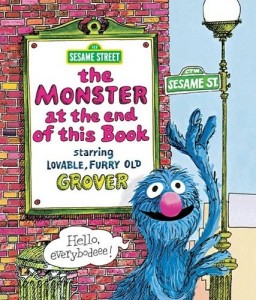
The cover of this book promises a monster, which implies there’s going to be a battle. But there’s no battle. There is barely even a monster! Just some blue gamma male wimp who begs and pleads with you to stop reading the book on every page.
Looking at the obviously inflated Amazon reviews I can only conclude that a number of weak-willed liberal readers gave in to this blue cuck’s loathsome SJW bullying tactics and stopped reading before the disappointing reveal. Of course this doesn’t stop them from lavishing it with glowing reviews. These people care only about politics and demographics, not merit or value.
Well, I read it all the way to the end. The last thing you want to do is tell this red-blooded American he mustn’t do something or shouldn’t read something because I believe in the first amendment and I will read whatever the hell I want.
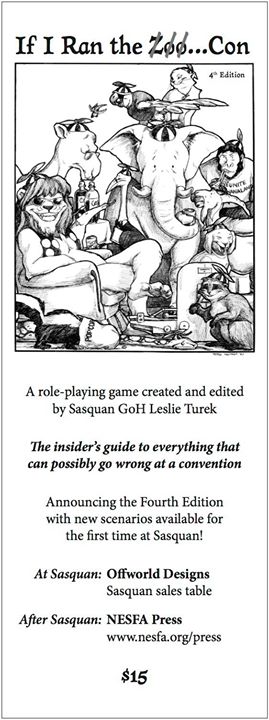 Sasquan guest of honor Leslie Turek is preparing a 4th edition of the Worldcon runners’ role playing game If I Ran the
Sasquan guest of honor Leslie Turek is preparing a 4th edition of the Worldcon runners’ role playing game If I Ran the 



